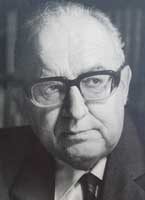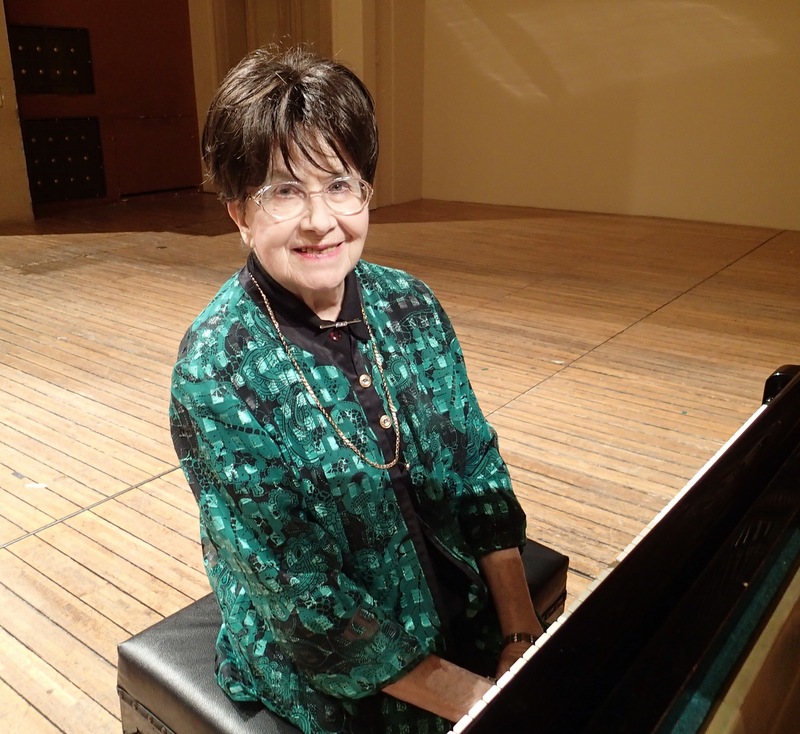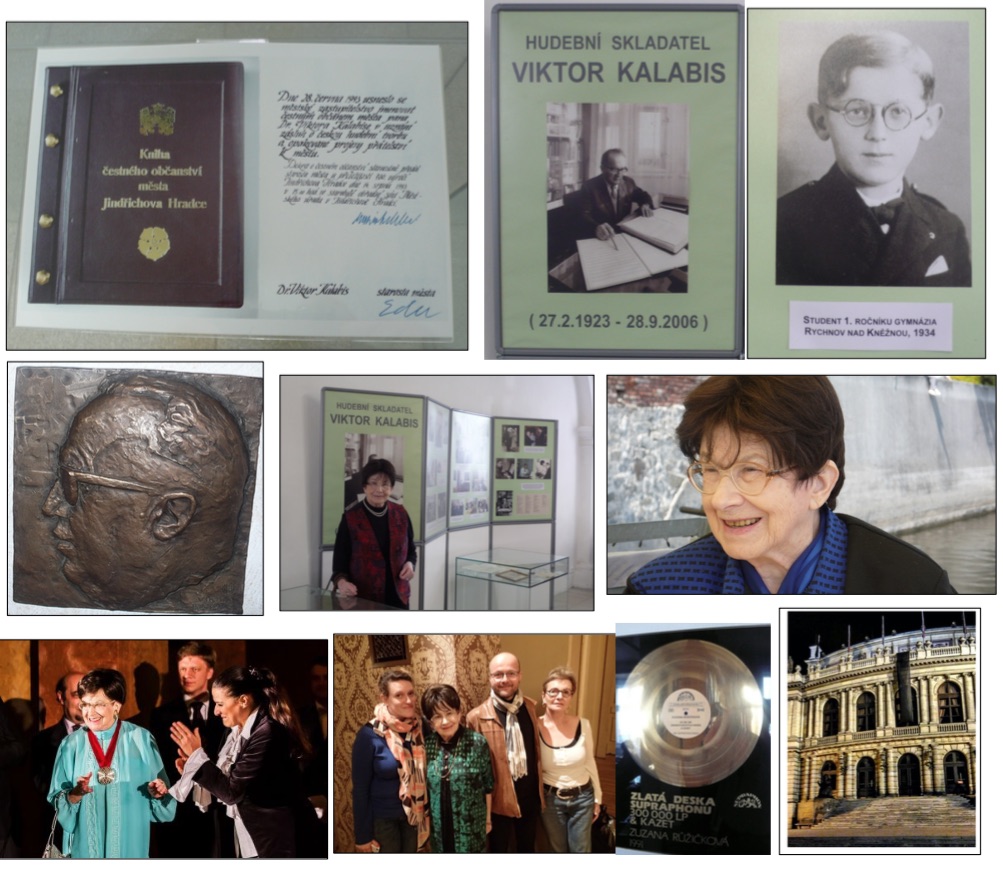A Remarkable Partnership

Viktor Kalabis (1923-2006)
Viktor was born in the Bohemian town of Cerveny Kostelec in 1923 and came from a family steeped in musical tradition. His great-grandfather, Tomas Hruska of whom a portrait still exists, was a graduate of the Prague Conservatoire. He died in Prague in September 2006.
At the age of six Viktor was giving public piano performances. Hopes of studying music in Prague were dashed by the Nazi occupation, which forced him to become a factory worker. He, nevertheless, found enough spare time to conduct a choir, play as a pianist in a local trio and commute to Prague where he took lessons in composition with Jaroslav Ridky at the Academy of Music, and in conducting with Pavel Dedecek.
After the war, Viktor completed his studies at the Prague Conservatory (class of prof. Emil Hlobil) and inscribed at the Academy of Music and Charles University (philosophy and musicology). There he passed all the examinations but was denied his doctorate because his thesis on Bartok and Stravinski was not accepted, both being dubbed by the regime as “formalistic and decadent.”
Only after the fall of communism in 1990 did he receive his doctorate in a rather poignant ceremony together with many other outstanding personalities in arts and sciences who had shared the same fate.
At the Academy of Music, Viktor met Zuzana Růžičková. They were married in 1952. They both refused to join the Communist Party and faced many difficulties.

Zuzana Ruzickova (1927-2017)
Zuzana Ruzickova was one of the world’s leading harpsichordists. Her more than 65 recorded albums and thousands of public performances from the early 1950s to 2006 have won her legions of fans and thrilled audiences across the world. She was born in Pilsen, Czechoslovakia, in 1925, and has become a force for good music off the stage as a teacher and mentor to young students, as a director over many years at the Prague Spring Festival and as a leader in the overlapping stages of outstanding Czech musical performance and J.S. Bach. Zuzana is the winner of many honors in many countries for her performances and her recordings of Bach, and she often says that it has been his inspiration that has not only imbued every facet of her musical life, but the very spirit of her life as well. Zuzana had a wonderful marriage with Viktor that spanned more than 50 years.
She was a remarkable woman. She is warm and witty, speaks many languages and processes an inner spirit of courage and determination. In an interview with Ian Willoughby for Radio Prague, she offers us a glimpse into the horrors that befell her at the hands of the Nazis, from Terezin to Auschwitz, to slave labor in Germany where only clumps of grass saved her and her mother from starvation, to the death camp of Belsen.
Zuzana and her mother survived the war and returned to Czechoslovakia, but her burning desire to become a professional musician seemed doomed. She weighed just a few pounds and was acutely undernourished. At 19 years of age, she seemed too old to start studying for an eventual professional musical career. Yet, tremendous determination, the wonderful good fortune of meeting Viktor and her brilliant talent led her to win a major competition in Munich. From then onwards her international career was set, but the Czech Communist Party were not about to respect this non-Party member. The authorities did not allow her to teach Czech students, determined her travel schedules, withheld foreign earnings and never let her and Viktor forget for a moment that they were constantly being watched. Nevertheless, they could not stop her international climb to the zenith of harpsichord performances and international acclaim. Like Viktor, it was only with the collapse of communism that Zuzana really was granted the respect – as a professor and as a musical leader – in her home country that she so richly deserved.
Zuzana ceased to give public performances in 2004. However, she remained enormously active in Czech musical life, while at the same time promoting Viktor’s music, developing the Foundation and, because of constant demands, talking in public about the Holocaust.
In December 2003 Zuzana Ruzickova received from Joel de Zorzi, French ambassador to the Czech Republic, the honour ‘Chevalier de l’Ordre des Arts et des Lettres’.
Ambassador de Zorzi noted: This is a very special honor for harpsichordist Zuzana Ruzickova since she has always had a unique relationship with France. In this country, Ruzickova has written some of the best pages in her career as an early music performer, and the French audience has always acclaimed and supported her. As a harpsichordist, she has published many records with different French labels since she is one of the best performers of early music by French composers such as Rameau and Couperin.
The Ambassador added that at the moment, Zuzana Ruzickova is a professor at the Prague Academy of Music. She has given master classes in Prague, Zurich and at the Bach Akademie in Stuttgart. She has toured North America, Canada, Australia and Japan with her music and has received the ‘Grand Prix du Disque de l’Acadamie Charles Cross’ three times.
Ms. Ruzickova achieved international renown as the first soloist in history to record Bach’s complete keyboard works. The collection, originally made for the French label Erato from 1965 to 1974, filled 35 records and was rereleased last year by Warner Classics in advance of her 90th birthday.
Washington Post
Ruzickova, who was often referred to as the first lady of harpsichord, was the wife of composer Kalabis (1923-2006). She won fame for her performance of Johann Sebastian Bach.
Czech News Agency
Ms. Ruzickova achieved international renown as the first soloist in history to record Bach’s complete keyboard works. The collection, originally made for the French label Erato from 1965 to 1974, filled 35 records and was rereleased last year by Warner Classics in advance of her 90th birthday.
Washington Post
Ruzickova played music that spanned baroque to contemporary, but was the first musician to record all of Bach’s music for harpsichord.
The Associated Press
Die tschechische Cembalistin Zuzana Růžičková ist im Alter von 90 Jahren gestorben. Das berichtete die Agentur CTK am Mittwoch unter Berufung auf ihren Stiftungsfonds für Musiker. Als Erste spielte Růžičková zwischen 1965 und 1974 die kompletten Bach-Werke für Tasteninstrumente auf dem Cembalo ein. Die Aufnahmen erschienen voriges Jahr in einer Neuauflage auf 20 CDs.
Musik Heute
Die einzige Tochter eines jüdischen Spielzeugwarenhändlers aus dem tschechoslowakischen Pilsen überlebte vier Konzentrationslager. Bei der Befreiung in Bergen-Belsen waren ihre Hände völlig zerschunden, wenig später galt Zuzana Růžičková als eine der wichtigsten Cembalistinnen der Welt.
Der Spiegel
To explain Zuzana Ruzickova would mean explaining how music is more than entertainment, how every faculty of the mind and the heart devoted to music is energy well spent.
Mahan Esfahani, The New Yorker
Ms. Ruzickova, is widely credited as the first harpsichord soloist to record Bach’s complete works for keyboard instruments — passionate and spirited music that was the one constant in a turbulent life in which she survived the gas chambers, devastating disease, slave labor and crippling hand injuries.
The New York Times
The renowned harpsichordist Zuzana Ruzickova, a Holocaust survivor who became the first soloist to record Johann Sebastian Bach’s complete works for keyboard instruments, has died aged 90.
The Guardian
Zuzana Růžičková survived three concentration camps, including Auschwitz and Bergen Belsen, before going on to become the first person to record Bach’s complete works for the harpsichord.
The Jewish Chronicle (UK)
Harpsichordist known as ‘Mrs Bach’ who survived the Nazi camps and Communist persecution.
The Times, UK
La musicienne entretenait en effet avec la France ce qu’elle appelait une « relation de cœur » : le titre de Chevalier des arts et lettres lui avait d’ailleurs été décerné en 2003 par l’ambassadeur de France à Prague.
Le Monde
Zuzana Růžičková überlebte das Konzentrationslager. Ihre Hände waren zerschunden, doch sie kämpfte sich zurück ins Leben und wurde zu einer der bedeutendsten Bach-Interpretinnen des 20. Jahrhunderts. Die tschechische Cembalistin ist am 27. September in Prag gestorben.
DEUTSCHLANDFUNK

RECOGNITION
1968 – Artist of Merit (CZ)
1989 – National Artist (CZ)
Professor of the Academy of Music in Prague (CZ)
2004 – Chevalier des Arts et des Lettre (France)
Hon. Member: Direktorium „Neue Bachgesellschaft“ Leipzig (The New Bach Society
Hon. Member The Dvorak Society for Czech Music
NEMA (National Early Music Association of Great Britain)
Honorary citizen of the town Jindrichuv Hradec (CZ)
Honorary citizen of the township Praha 3
Lifetime Award from the Bohemian Heritage Foundation
Lifetime Award for Contributions to Culture and the Humanities, Ministry of Culture, Czech Republic 2017
Lifetime “Platinum Disc” Award from Supraphon, June 2017
UK Critics Circle “Special Award” 2018
Medals include:
2004 – Medal of Merit 2. Grade for Arts and Culture of the President of the Czech Republic
1993 – Medaille für Kunst und Wissenschaft der Freistadt Hamburg
& Kulturpreis – City of Aaachen
1997 – Medal for Contribution to „Golden Funds of Supraphon“
2001 – Medal of „Harmony“ Musical Review
2001 – Prize for Contribution to Czech and World Music 1956 – ARD International Music Competition, Munich
Spring 2017 – Zuzana receives a lifetime award in Prague from the Czech Minister of Culture.
Additional Prizes:
4 time winner of the Grand Prix Charles Cros (J. A. Benda, J. S. Bach)
Diapason d´Or (Henry Purcell)
Golden Disc Supraphon (300 000 LP´s, CD´s and tapes sold)
Other International Media: Rozhlas – Czech Prague Daily Monitor – Czech Liberation – France Le Figaro – France Suddeutsche Zeitung – Germany Arutz Sheva – Israel El Universal – Mexico Herald Scotland – Scotland Zoznam – Slovakia
Other Czech media: Hospodarske noviny (Economia) – Lidove noviny – MF Dnes – Divadelní noviny – Aktualne.cz –Novinky.cz – Harmonie
Memories
Zuzana provided the Foundation with many photographs over the years, performance programs and other wonderful documents about her life and about Viktor. In addition, Frank Vogl took many photographs as well. On this page we highlight some of the collection.



